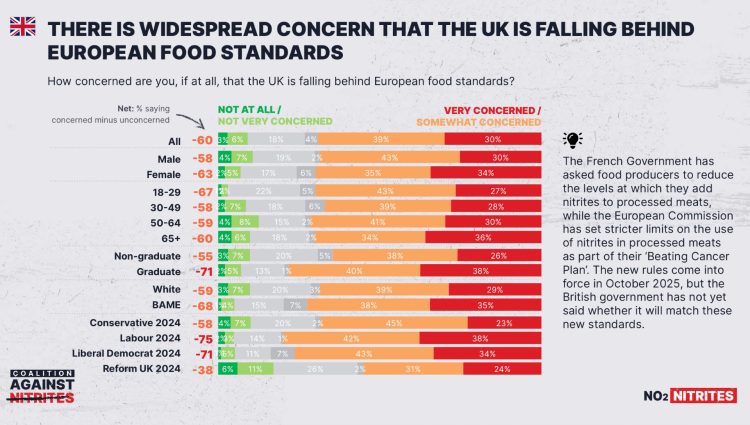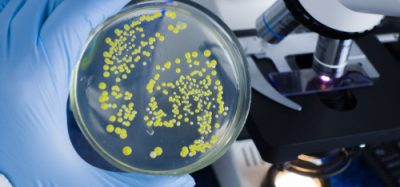Leading food and health experts demand UK ban on nitrites in processed meats
Posted: 15 May 2025 | Ben Cornwell | 1 comment
A new coalition of scientists and politicians urges the UK Government to ban cancer-linked nitrites from processed meats like bacon and ham.


The newly-formed Coalition Against Nitrites, launched today to demand the removal of carcinogenic nitrites from bacon, ham and sausages.
A coalition of world-leading scientists and politicians has launched a major campaign urging the UK Government to ban nitrites in processed meats, warning that continued inaction is putting public health at risk and leaving the UK lagging behind European food safety standards.
Knowing what we know today about the health risks of added nitrites, it’s time for a serious conversation about the safety of our food…
The newly-formed Coalition Against Nitrites, backed by prominent scientists including three former World Health Organization (WHO) experts, launched today to demand the removal of carcinogenic nitrites from bacon, ham and sausages.
“The UK’s departure from the European Union has meant we have slipped behind European food standards,” said Professor Chris Elliott OBE, who founded the Institute for Global Food Security at Queen’s University Belfast and led the UK Government’s investigation into the 2013 horse meat scandal.
“While the EU has sought to protect its consumers with better food safety rules, the UK has dithered, leaving British consumers at greater risk. It is essential the UK keeps pace with the EU’s improving food safety rules for the sake of public health.”
Nitrites linked to cancer and consumer concern
Nitrites, commonly used to preserve colour, flavour and shelf life in cured meats, have been strongly linked to the formation of nitrosamines in the stomach – compounds recognised as cancer-causing. In 2015, the WHO classified processed meats containing nitrites as Group One carcinogens – placing them in the same category as tobacco.
Support for removing these additives comes from across the scientific community.
Professor Walter Willett of Harvard University, one of the world’s most influential nutritionists, said: “It is time for governments globally to step in and ban the use of these chemicals – or for food producers to make the right decision for human health and remove these dangerous chemicals themselves from their products.”


The Coalition’s launch follows a J.L. Partners poll showing that 69 percent of Britons support removing nitrites from processed meats and are concerned the UK is falling behind the EU.
Furthermore, three-quarters of UK respondents believe the government should match Europe’s tightening rules on nitrite use.
UK inaction contrasts with European progress
The EU’s updated regulations lower the permitted levels of nitrites in processed meat products, with full enforcement expected by October 2025.
In contrast, the UK Food Standards Agency (FSA) maintains that nitrites are “essential” to prevent botulism – despite no recorded cases being linked to nitrite-free meats and a leaked 2019 report commissioned by the British Meat Processors’ Association suggesting nitrites offer no such protection.
In contrast, the UK Food Standards Agency (FSA) maintains that nitrites are “essential” to prevent the growth of harmful microorganisms, particularly clostridium botulinum, a bacterium that can be life threatening. The FSA notes that nitrites are used to preserve colour and develop flavour, but places primary emphasis on safety against bacterial threats. However, no recorded cases of botulism have been linked to nitrite-free processed meats – and a leaked 2019 report commissioned by the British Meat Processors’ Association suggests nitrites offer no such protection.
Cross-party support builds momentum
Lord James Bethell, a former Conservative health minister, backed the Coalition’s call, stating: “Colorectal cancer is the fourth most common cancer in the UK, with approximately 44,100 new cases diagnosed every year – the equivalent of 120 cases every day.
“As a former Health Minister, I know first hand the scale of the challenge this presents, both for the Government and for our NHS.
“The Health Secretary has made it clear he understands the importance of improving the UK’s approach to prevention. The removal of harmful food additives such as nitrites from processed meat, as recommended by the Coalition Against Nitrites, would be a good place to start.”
Professor Paolo Vineis of Imperial College London, a co-author of the WHO’s 2015 report, called the government and food industry’s inaction to reduce the risk these foods pose “disappointing”, adding:
“I would personally like to see a considerable reduction in the volume of processed meat consumed, but removing nitrites from products like bacon, ham and sausages would also be a positive step in improving the health of the population. As demonstrated by producers in my home country of Italy, it can be done.”
The Coalition’s support spans seven UK political parties. It includes Lord Bethell, Labour MP and former shadow health minister Sharon Hodgson, DUP’s Jim Shannon MP, Baroness Bennett of the Green Party, Baroness Jenny Jones and Baroness Margaret Ritchie.
Hodgson said: “Knowing what we know today about the health risks of added nitrites, it’s time for a serious conversation about the safety of our food.”
Continental reforms and market realities
Across Europe, the campaign is also gaining traction. Supporters include Richard Ramos, a French MP leading similar efforts in France; Floriana Cimmarusti, Director General of Safe Food Advocacy Europe; and Antonella Cardone of Cancer Patients Europe.
France has already begun phasing out nitrites. In March 2023, it unveiled an action plan aiming for an immediate reduction of nitrite additives in deli meats by approximately 20 per cent. This followed a parliamentary bill and national strategy to reduce usage. France’s health agency ANSES has since confirmed a direct link between nitrites in ham and colorectal cancer.
Despite longstanding industry reliance on nitrites, alternative nitrite-free products are already on the market. Supermarket chains including M&S, Waitrose, Carrefour and Asda now stock processed meats made without nitrites.
Brands such as Finnebrogue, Denhay and Helen Browning offer nitrite-free options, as does traditional Italian Parma Ham, which has been made without nitrites for over half a century.
Still, over 90 per cent of the European bacon, ham and charcuterie market remains dominated by nitrite-containing products. Yet, the J.L. Partners poll revealed that British consumers value nitrite-free labels above other health considerations like reduced salt, fat or sugar content. Even in Germany – a nation known for its cured sausages – 68 percent of respondents said they would support removing nitrites from products such as Frankfurters and Bratwurst.
Professor Elliott reinforced the point: “While I welcome the progress made by some companies to remove these carcinogenic chemicals, much more needs to be done, particularly now it is clear they are not required to either prevent botulism or produce the delicious products so many of us love to eat.”
“We will not rest”
The Coalition’s mission is unequivocal: “With new technologies now available to produce processed meats without nitrites – while maintaining the same taste, appearance, and cost – there is no justification for their continued use.”
Professor Chris Elliott concluded: “As someone who has campaigned for the ban on nitrates in meat for many years I’m exceptionally delighted at the launch of the coalition. I have agreed to act as the President of the movement. We will not rest until our mission to save many lives from the unnecessary addition of these chemicals to our food is complete.”
Related topics
Food Safety, Health & Nutrition, Ingredients, Regulation & Legislation, The consumer, Trade & Economy, World Food










Please ban the nitrites.